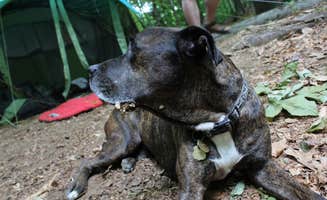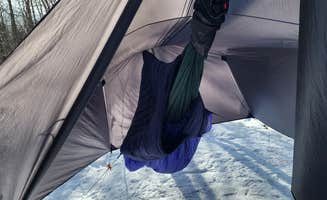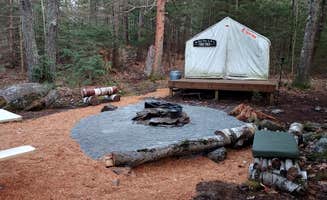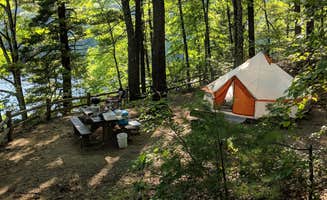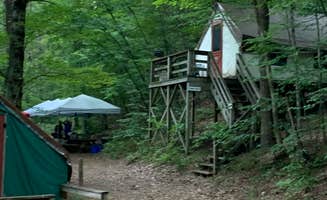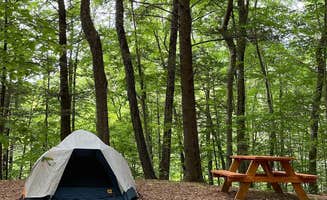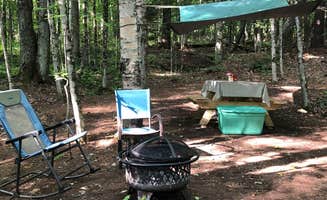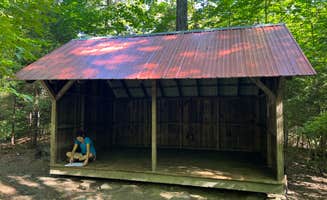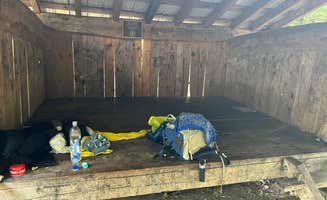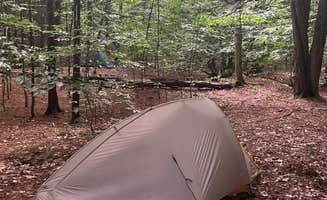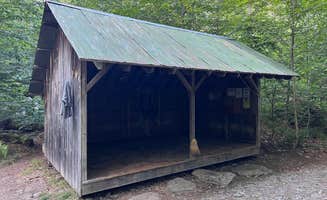Tent camping near Walpole, New Hampshire centers around the Connecticut River Valley, situated at approximately 900 feet elevation with surrounding peaks reaching 1,500-2,200 feet. The camping season typically runs from mid-May through mid-October, with average summer temperatures ranging from 55-80°F and frequent afternoon thunderstorms during July and August. Walk-in tent sites dominate the area, requiring campers to transport gear from parking areas using provided carts or personal equipment.
What to do
Kayaking at Little Rock Pond: The pond maintains surprisingly warm water temperatures despite its elevation, making it perfect for swimming from late June through August. Little Rock Pond Group Camp & Shelters offers direct water access and a notable jumping rock on the far side. As one camper notes, "There's a huge jumping rock on the far side of the pond."
Hiking to Stratton Pond: Access multiple trail systems including the Appalachian Trail and Long Trail from the shelter area, with winter camping options for experienced hikers. Stratton Pond Shelter sits at "the intersection of AT, LT and Stratton Mountain trail" and features "at least 16 bunk spaces in the shelter" according to visitor reviews.
White water rafting: Several outfitters offer guided trips on the Deerfield River from May through September, with difficulty levels ranging from beginner to advanced. A visitor to Zoar Outdoor mentions, "Staff was awesome, went out of their way to take care of our group from camping to rafting."
What campers like
Primitive camping experience: The restricted vehicle access creates a quieter environment with minimal noise pollution. At Tully Lake Recreation Area, "No cars at all at the campsites, which was great for peace of mind as our toddler roamed around. It also made for a super quiet stay."
Wildlife viewing opportunities: Early morning offers opportunities to spot deer, wild turkeys, and various bird species. At Little Rock Pond, campers appreciate that "the pond is surprisingly warm for its altitude and it's home to two Common Loons."
Sustainable facilities: Many campgrounds in the region emphasize environmental practices. As noted at Stratton Pond Shelter, there are "2 outhouses" available, while other sites feature composting toilets that require "no #1, just #2."
What you should know
Gear transport requirements: Many sites require significant hiking or use of wheeled carts to transport equipment. A Barton Cove Campground visitor notes the logistics: "you check in at the office, grab a key to unlock the gate, drive to the campground, unlock gate, drive through gate, lock gate, unload your stuff, drive to gate, unlock gate, drive through gate, lock gate, return key, drive back to campground, walk to your site."
Limited amenities: Most tent-focused campgrounds have basic facilities located at central areas. Campers at Barton Cove report: "Rustic camping only- sites have tent platforms, grill, fire pit and picnic tables. Porta potties and latrines were very clean. There is 1 or 2 places to grab water so make sure to bring refillable containers."
Weather preparedness: Late afternoon thunderstorms occur frequently in summer months, particularly in July. A winter camper at Stratton Pond described: "Cold, Snow, Wind, full moon in the middle of the woods with only the people I hiked in with. It was great!"
Tips for camping with families
Site selection for privacy: Choose campsites farther from main facilities for more seclusion. At Maple Ridge Farm, "They'll drive you in an ATV up to some of the sites that are further away from the parking lot" which creates additional distance from other campers.
Water access consideration: Sites near water bodies may offer recreation but less privacy. A Tully Lake visitor noted that "Sites closer to the water that we saw were less private, but still very peaceful and spread out."
Activity planning: Schedule structured activities for children during longer stays. Barton Cove campers mention that "You can't swim (unless you rent a canoe/kayak and swim while you're out on the water) and sites are fenced in due to how steep it is to the water."
Tips from RVers
Tent-only restrictions: Most walk-in campgrounds in the region explicitly prohibit RVs and large vehicles. At Lost Boys Hideout, the setup is described as "Simplicity at it best :)" with recent improvements including "new tents provided at Sleepy Hollow site. Improvements to the firepit, area all mulched."
Alternative accommodations: Consider glamping options when transitioning from RV to tent camping. Lost Boys Hideout has implemented "Lots of new upgrades since pictures" including some sites where tents are already set up for visitors.
Accessibility concerns: Many tent sites in the Walpole area require significant walking that may be challenging for those with mobility issues. At Zoar Outdoor, amenities are described as "well maintained. Could use a refresh but overall great experience."


